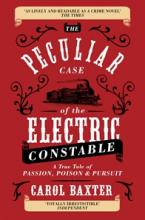Review - THE PECULIAR CASE OF THE ELECTRIC CONSTABLE, Carol Baxter
When you don't read blurbs, or avoid coverage of a book that you know you're going to read eventually, some things can come as a considerable surprise. Things like THE PECULIAR CASE OF THE ELECTRIC CONSTABLE being a true story.
The starting premise of the book is the speedy identification and capture of an alleged murderer by an early electric telegraph. If you think, however, that this is the whole point of the story, then you are going to be disappointed. Whilst there is background to the scepticism of the system's worth and the difficulties in getting an installation up and running, the telegraph's usefulness in this particular case, is done and dusted very quickly as the story becomes all about John Tawell and his assumed guilt in the murder of a young woman.
Not that the alternative focus is necessarily a major disappointment as John Tawell is a fascinating character. A supposedly pious and sincere Quaker he's been a surprisingly naughty boy. He's also gifted with a major talent for refusing to acknowledge his part in his own downfall. Long after he's ejected from the Quaker church he's still trying to buy, bribe and cajole his way back. He's still walking around dressed as a Quaker, still participating as much as he can in the community. You can almost hear the Quaker elder's teeth grinding as Tawell simply will not go away.
Whilst the known facts of Tawell's life, his crime(s) and his subsequent trial for murder are built into the story, this reads like a ripsnorter of a yarn. The pace clips along, and the actions of Tawell are beautifully described, as are the reactions of everyone around him. The author appears to be in as much doubt as to WHY as anybody else is by the end of the story (although which "why" ... well that would be telling). That seems to be absolutely fair - allowing the reader to question, consider and resolve in their own minds if they are of a mind to do so.
As unexpected as THE PECULIAR CASE OF THE ELECTRIC CONSTABLE was, and as unlikely as the scenario may seem, even allowing for the slightly misleading title of the book itself, this was a very interesting, engaging book and as silly as this sounds, a tall tale but true.
When Quaker forger John Tawell disembarked in Sydney in 1815, none could have imagined that he would become the most historically 'influential' - albeit unwittingly - of Australia's 160,000 convict transportees. Tawell established Australia's first retail pharmacy and built the first Quaker meeting house in New South Wales. He became a rich convict nabob like his colleague Samuel Terry, the Botany Bay Rothschild, however unlike Terry he eventually decided to take his fortune home to England.
Shunned by the Quakers and ridiculed by the broader community, he was a deeply troubled man when he caught the 7.42pm train from Slough station near Windsor Castle on New Years' Day 1845, leaving a dying woman sprawled on a nearby cottage floor. Had he murdered her or hadn't he?
Between Slough and London's Paddington railway station ran the only electric telegraph operation in the entire world that was capable of sending a random message at a moment's notice. 'A murder has just been committed,' began the message that pursued Tawell. The consequences were extraordinary. Tawell's trial was a sensation, the struggling electric telegraph industry became a phenomenal success, the electricity industry was launched, and the Communication Revolution began.

